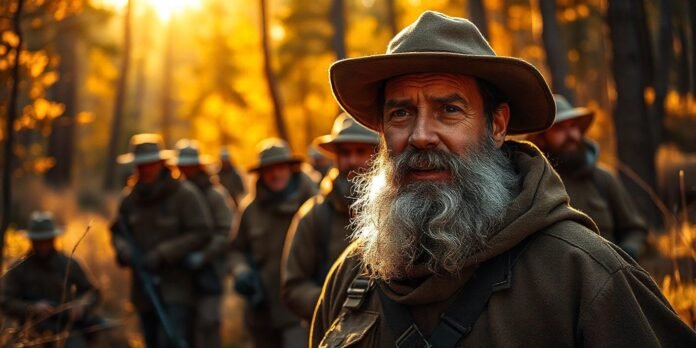Introduction
For those with a passion for the outdoors and a deep respect for nature, becoming a hunting guide can be a fulfilling career. This profession combines expert hunting knowledge, survival skills, and leadership to provide clients with safe and successful hunting experiences. If you’re prepared to embrace the challenges and rewards of guiding, this guide will help you navigate the path to becoming a professional hunting guide.
Essential Skills for a Hunting Guide
A successful hunting guide needs a combination of technical knowledge, outdoor skills, and interpersonal abilities. Here are the core competencies:
- Tracking & Game Identification – Understanding animal behavior, footprints, scat, and calls.
- Marksmanship & Weapon Proficiency – Expertise with rifles, bows, and other hunting equipment.
- Survival & Bushcraft – Navigating rough terrain, fire-starting, shelter-building, and finding water.
- First Aid & Emergency Response – Wilderness first aid, CPR, and injury management.
- Client Relations & Communication – Ensuring a positive experience by instructing and supporting clients.
- Field Dressing & Meat Processing – Properly handling game for ethical use and client satisfaction.
Certification & Licensing Requirements
Regulations vary by region, but most jurisdictions require specific certifications to operate as a hunting guide. Common requirements include:
- Hunting Guide License – Issued by state or provincial wildlife agencies.
- First Aid & CPR Certification – Essential for ensuring client safety.
- Firearm Safety Course – Required in many regions, particularly for big game hunts.
- Commercial Permits – If operating on public lands, special permits may be needed.
Check with your local fish and wildlife department to understand the specific legal requirements for guiding in your area.
Types of Hunting & Specializations
A hunting guide can specialize in various types of hunts, including:
- Big Game Hunting – Guiding for deer, elk, moose, or bear.
- Waterfowl Hunting – Targeting ducks and geese with decoys and blinds.
- Upland Bird Hunting – Pursuing pheasants, quail, or grouse with trained dogs.
- Predator Hunting – Hunting coyotes, bobcats, and mountain lions for population control.
- Bow Hunting – Specializing in guiding archery hunters for a more challenging experience.
Gaining Experience
Before becoming a full-fledged guide, gaining hands-on experience is crucial. Here are some ways to build your skills:
- Work as an Apprentice – Learn from seasoned guides by assisting on hunts.
- Volunteer for Conservation Efforts – Gain field experience while supporting wildlife management.
- Hunt Extensively – Personal experience in different terrains and seasons will hone your skills.
- Attend Guide Schools – Institutions like the Colorado Outdoor Adventure Guide School offer formal training.
- Network with Outfitters – Connecting with professionals can lead to job opportunities.
Safety & Ethical Considerations
Safety and ethics should always be top priorities for a hunting guide. Key measures include:
- Firearm & Bow Safety – Always enforce proper handling and shooting protocols.
- Emergency Preparedness – Have a plan for injuries, lost clients, or extreme weather.
- Leave No Trace – Preserve the environment by minimizing human impact.
- Fair Chase Ethics – Ensure that all hunting methods align with ethical hunting standards.
- Client Safety Briefings – Educate hunters on safety procedures before each trip.
Earnings & Career Outlook
A hunting guide’s income depends on experience, location, and clientele. General earnings include:
- Entry-Level Guides: $2,000 – $3,500 per month during the season.
- Experienced Guides: $4,000 – $7,000 per month.
- Outfitters/Business Owners: $50,000 – $100,000+ annually, depending on business success.
Many guides supplement their income by offering off-season services like fishing charters, wilderness survival courses, or guiding international hunts.
FAQs
What skills do I need to become a hunting guide?
You need tracking, survival, first aid, firearm proficiency, and strong communication skills.
Do I need a license to be a hunting guide?
Yes, most states and provinces require a guide license, along with first aid and firearm safety certifications.
How can I gain experience before becoming a guide?
Work as an apprentice, hunt extensively, attend guide schools, and volunteer for conservation projects.
What safety measures should a hunting guide follow?
Always prioritize firearm safety, client briefings, emergency preparedness, and ethical hunting practices.
How much can a hunting guide earn?
Earnings range from $2,000 to $7,000 per month for guides, while outfitters can make $50,000+ annually.
Conclusion
Becoming a professional hunting guide requires dedication, knowledge, and field experience. By mastering essential skills, obtaining necessary certifications, and upholding ethical hunting practices, you can build a successful career in this rewarding and rugged profession. Start your journey today, and embrace the adventure of leading hunters into the wild!


